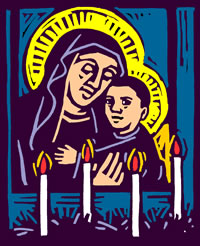
4th Sunday of Advent Year C
Our Advent season draws to a close with a liturgy filled with promise and expectation. Luke’s gospel text describes the first meeting of John the Baptiser with the Lord he is to herald so selflessly – in a tableau rich in implications, as we shall see. The first reading from the prophet Micah sums up the immense hopes about to be realized with the coming of the New David. The messiah will be born in Bethlehem, the city of David; he will be a mighty leader, gathering God’s scattered people and exercising a rule giving expression to God’s ‘power and majesty’; he will, in fact, be peace personified (cf. Eph 2:14).
The reading from the letter to the Hebrews describes how the Saviour’s coming inaugurates a new and final order of things in the plan of God. The old covenant, with its animal sacrifices and burnt offerings, was only a foreshadowing. Many times the prophets, in the name of God, had rebuked the people for relying upon these external observances while their hearts were far from God and God’s ways. Jesus himself was to run up against this same attitude. The letter to the Hebrews, we know, was written for people who looked back nostalgically to the rituals of old Israel, inviting them to leave these shadows behind and rejoice in the reality they pointed to. Today’s passage takes us to the heart of the matter - the eternal designs of God shaping the mission of the eternal Son made man. True worship, as the psalm quoted reminds us (Ps 40), is giving one’s life over to God in fidelity and obedience. The Saviour’s becoming one of us, and giving himself –’once and for all’ – into the hands of his Father, through his Paschal Mystery, has realized this pattern in a manner beyond all human expectations. By this self-offering, he has become the true worship of the whole of creation. More than that, he has united us to himself in his act of worship – God’s ‘will was for us to be made holy by the offering of his body’.
But all of this is in the future, as Luke describes the dawn of salvation. Presenting the meeting of Mary and Elizabeth, he invites us to recognize how much is involved in the drama that is beginning. It realizes the designs of the eternal Father, whose ‘promise made to Mary is fulfilled’; the Old Testament and its time of waiting is coming to an end, as its final and greatest spokesman recognizes the coming of the Son of God; it is through Mary – ‘most blessed of all women’ – that this dawn of salvation takes place; and it is through the power of the Holy Spirit that Mary has conceived, and Elizabeth with her child are able to enter into the joy that faith in this coming, or advent, brings to the world.
John Thornhill sm

